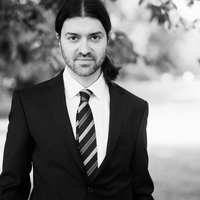Podcast episode
April 30, 2019
Episode 63: Dylan Burns on the ‘Underworld of Platonism’

‘If you think about it for a second, you could look at all western esotericism – however you construe it – as a kind of evolving reception-history and transformation of exactly this body of texts.’
Near the end of John Dillon’s classic study The Middle Platonists (1977) comes an intriguing section entitled ‘Some Loose Ends’. It is here that lovers of western esotericism will find some of the most interesting materials: philosophic-religious movements of the Roman period which employed and transformed ideas stemming from the Platonist tradition for new ends. These movements produced texts – the Chaldæan Oracles, the Hermetica, and the many so-called Gnostic tractates – which have had an absolutely central influence on western esoteric currents from antiquity to the present day.
Since the publication of The Middle Platonists, scholarship has come a long way. The contents of the document trove from Nag-Hammadi have become public, broadening our first-hand understanding of Gnosticism; much work has been done, too, on the Chaldaan Oracles, and a flowering of scholarly interest in the Hermetica has opened new paths for understanding these fascinating texts. In this interview our guide to all things ‘Underworldly Platonist’, Dr Dylan Burns, discusses all these materials, considering what commonalities they shared, their status as ‘Platonist’, the question of how ‘underworld’ or marginalised these works were in their time, and much more.
Interview Bio:
 Hailing from Jacksonville Florida and Boulder Colorado, Dylan Michael Burns is a historian of philosophy and religion in late antiquity, specialising in Coptic Gnostic literature and later Greek philosophy. He earned his Ph.D. in religious studies from Yale University, was awarded a postdoc in Copenhagen, and then became project manager for the digital philology project Database and Dictionary of Greek Loanwords in Coptic, now based in Berlin.
Hailing from Jacksonville Florida and Boulder Colorado, Dylan Michael Burns is a historian of philosophy and religion in late antiquity, specialising in Coptic Gnostic literature and later Greek philosophy. He earned his Ph.D. in religious studies from Yale University, was awarded a postdoc in Copenhagen, and then became project manager for the digital philology project Database and Dictionary of Greek Loanwords in Coptic, now based in Berlin.
Although his work focuses on the ancient world, Dylan is also deeply interested in the the various reception-histories of ancient literature, in the middle ages and the modern world. The reception of ancient religion in New Religious Movements, particularly Neo-Paganism and Neo-Gnosticism, is the focus of a new volume of essays he has co-edited with Prof. Almut-Barbara Renger: New Antiquities: Transformations of Ancient Religion in the New Age and Beyond.
Works Discussed in this Episode:
- Alcinoüs: Dillon, J. (Ed.), 1993. The Handbook of Platonism. Clarendon Press, Oxford.
- Dillon, J., 1977. The Middle Platonists: A Study of Platonism 80 BC to AD 220. Duckworth, London.
- Majercik, R. (Ed.), 1989. The Chaldean Oracles. Brill, Leiden.
- Proclus, Platonic Theology: Saffrey, H. D. & Westerink, L. G. (Ed.), 1997. Théologie Platonicienne. Les Belles Lettres, Paris.
Recommended Reading:
General:
- Burns, D., 2015. ‘Ancient Esoteric Traditions: Mystery, Revelation, Gnosis,’ in The Occult World, ed. Christopher Partridge (Routledge Worlds; London: Routledge), 17–33.
- Idem, 2019. ‘New Lights on Oracles, Platonists, and Esotericism in Late Antiquity.’ Review article of Helmut Seng and Giulia Sfamena Gasparro, edd., Theologische Orakel in der Spätantike (Bibliotheca Chaldaica 5; Universitätsverlag Winter: Heidelberg, 2016), and Helmut Seng, Luciana Soares Santoprete, and Chiara O. Tommasi Moreschini, edd., Formen und Nebenformen des Platonismus in der Spätantike (Bibliotheca Chaldaica 6; Universitätsverlag Winter: Heidelberg, 2016), in Aries 19:1, 147–58.
- Tanaseanu-Döbler, Ilinca (2013). Theurgy in Late Antiquity: The Invention of a Ritual Tradition. Beiträge zur Europäischen Religionsgeschichte 1: Göttingen: Vandenhoeck & Ruprecht, 2013.
The Chaldæan Oracles:
- Athanassiadi, P. (1999). ‘The Chaldaean Oracles: Theology and Theurgy’. In: Athanassiadi, P. & Frede, M. (Ed.), Pagan Monotheism in Late Antiquity, Clarendon Press, Oxford.
- Des Places, E., 2003. Oracles chaldaïques. Les Belles Lettres, Paris.
- Lewy, H., 1978. Chaldaean Oracles and Theurgy. Études Augustiniennes, Paris.
The Hermetica:
- Bull, C. H., 2018. The Tradition of Hermes Trismegistus: the Egyptian Priestly Figure as a Teacher of Hellenized Wisdom. Brill, Leiden.
- Copenhaver, B. P. (Ed.), 1992. Hermetica. Cambridge University Press, Cambridge.
- Fowden, G., 1986. The Egyptian Hermes: A Historical Approach to the Late Pagan Mind. Cambridge University Press, Cambridge.
- Litwa, M. D. 2018. Hermetica II. Cambridge University Press, Cambridge.
Gnosticism:
- Bull, Christian H., Lied, Liv Ingeborg and Turner, John D. edd. (2011) Mystery and Secrecy in the Nag Hammadi Collection and Other Ancient Literature: Ideas and Practices. Studies for Einar Thomassen at Sixty (Nag Hammadi and Manichaean Studies 76). Brill, Leiden.
- Burns, D.M. (2014). Apocalypse of the Alien God: Platonism and the Exile of Sethian Gnosticism. University of Pennsylvania Press, Philadelphia.
- Lundhaug, Hugo and Jenott, Lance edd., 2018. The Nag Hammadi Codices and Late Antique Egypt, (Studien und Texte zu Antike und Christentum 110). Mohr Siebeck, Tübingen.
- Narbonne, Jean-Marc (2011). Plotinus in Dialogue with the Gnostics (Studies in Platonism, Neoplatonism, and the Platonic Tradition 11). Brill, Leiden.
- Rasimus, Tuomas, 2009. Paradise Reconsidered in Gnostic Mythmaking: Rethinking Sethianism in Light of the Ophite Evidence (Nag Hammadi and Manichaean Studies 68) Brill, Leiden.
- Robinson, J. M. (Ed.), 1977. The Nag Hammadi Library in English. Brill, Leiden.
- Turner, J., 2001. Sethian Gnosticism and the Platonic Tradition. Presses Université Laval/Éditions Peeters, Montreal/Louvain-Paris.
- Williams, M. A., 1999. Rethinking Gnosticism: An Argument for Dismantling a Dubious Category. Princeton University Press, Princeton, NJ.
Themes
Chaldæan Oracles, Gnosticism, Hermetica, Interview, Late Antiquity, Late Platonism, Marsilio Ficino, Middle Platonism, Numenius of Apamea, Philosophy, Plato, Platonism, Plotinus, Poimandres, Porphyry, Proclus, Valentinianism


Comments
Comments are open to SHWEP members only
Join now to comment
Already a member? Log in here